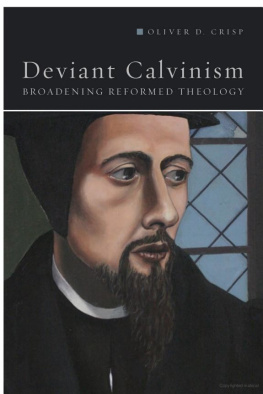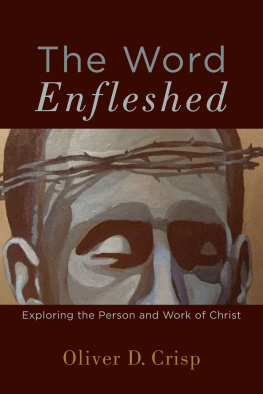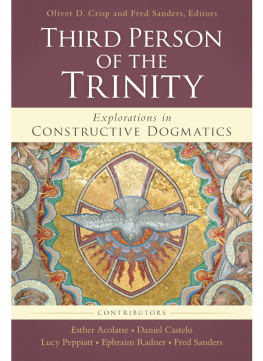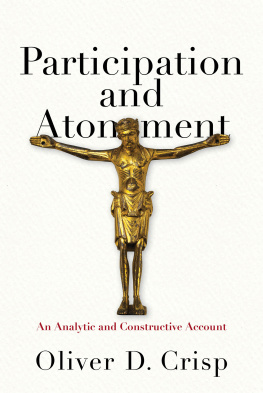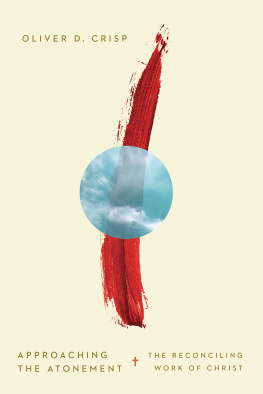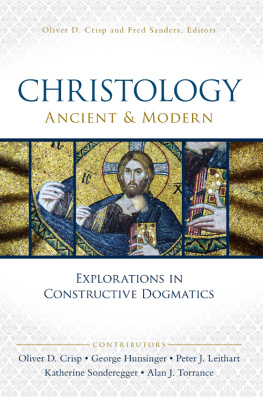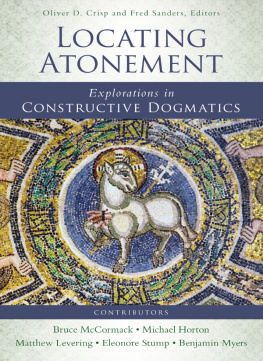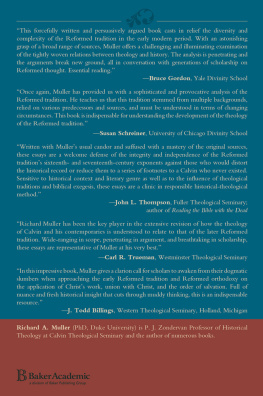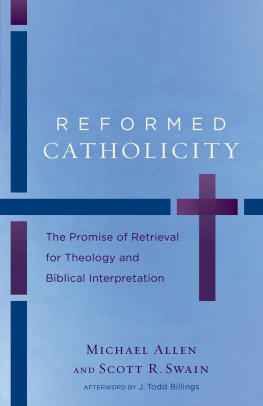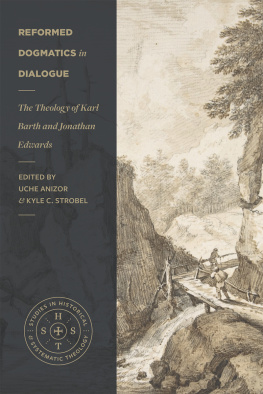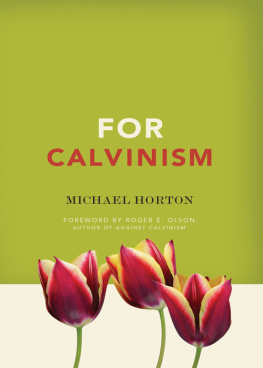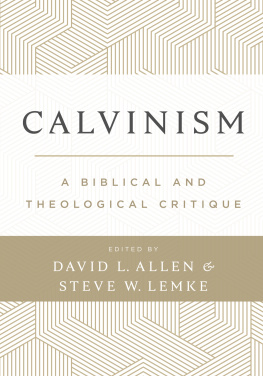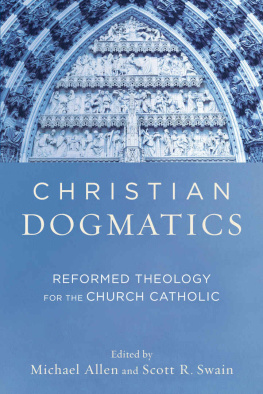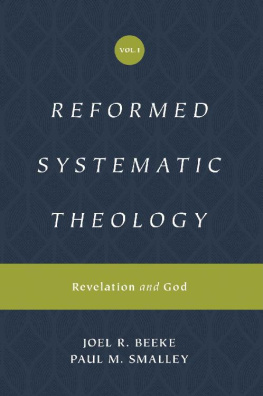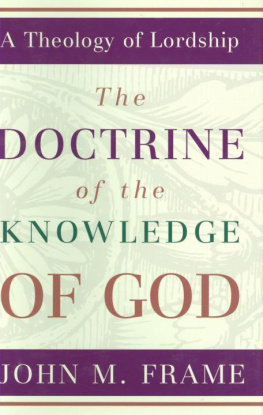Deviant Calvinism Broadening Reformed Theology Oliver D. Crisp Fortress Press Minneapolis DEVIANT CALVINISM Broadening Reformed Theology Copyright 2014 Fortress Press. All rights reserved. Except for brief quotations in critical articles or reviews, no part of this book may be reproduced in any manner without prior written permission from the publisher. Visit http://www.augsburgfortress.org/copyrights/ or write to Permissions, Augsburg Fortress, Box 1209, Minneapolis, MN 55440. Scripture quotations are from the New Revised Standard Version Bible, copyright 1989 by the Division of Christian Education of the National Council of the Churches of Christ in the USA. Used by permission. All rights reserved. Cover design: Laurie Ingram Cover image Oliver D. Crisp. Library of Congress Cataloging-in-Publication Data Print ISBN: 978-1-4514-8613-1 eBook ISBN: 978-1-4514-8759-6 The paper used in this publication meets the minimum requirements of American National Standard for Information Sciences Permanence of Paper for Printed Library Materials, ANSI Z329.48-1984. Manufactured in the U.S.A. This book was produced using PressBooks.com . To Gavin DCosta,
scholar and gentleman Contents
Acknowledgments
I have been thinking about the scope of salvation in the context of Augustinian and Reformed theology for more than a decade. This volume is a product of this period of theological rumination. It has definitely been a process, and the manuscript has gone through several iterations. Murder your darlings, says the novelist and critic Arthur Quiller-Couch about the difficult process of redaction. In my experience, implementing this instruction can be the cause of not inconsiderable literary anguish. Nevertheless, it is sound advice when it comes to the writing of books.
The finished product owes much to the gentle prodding of Robin Parry and his alter ego, Gregory MacDonald, especially chapters 68. The project is also indebted to Paul Helm, who may not be enamored of some of the conclusions reached but who was a fine dining companion, along with Robin, at the Air Balloon pub in Gloucestershire, England, where we talked and ate our way through a number of Friday afternoons in 200911. He has also read through and commented on a number of the chapters, to my great benefit. Interaction with Alan Torrance over lunch and at the theology seminar in St. Andrews way back in 2002 led directly to the writing of an earlier version of chapter 6. Gustation and theology seem to be agreeable companions. My friend and erstwhile colleague Gavin DCosta led a reading group with me at the University of Bristol when I taught there. We drank tea, ate biscuits, and talked through a number of papers by graduate students and faculty. Part of the first chapter was the product of our friendly but critical ecumenical interactions, and it was originally published alongside a piece by Gavin on being a Roman Catholic theologian. I have learned much from him about doing and embodying theology. I hope that he may be entertained by the thought of having a book of Reformed theology dedicated to him. Douglas Sweeney and Benjamin Myers also offered comments on an earlier draft of part of chapter 1. Doug may be happier with the characterization of Arminian evangelical thought offered in this version of the chapter than in its previous iteration. It is difficult to predict what Ben might say, but it is bound to be eminently quotable. Kevin Timpe gave me valuable feedback on the third chapter, as did Faith Pawl, much of which I have taken into account. Kevin may be disappointed to discover I stubbornly refused to substitute Alan Scott for Hal Jordan as the Green Lantern, however.
Claire Crisp listened to various readings and to my thinking out loud on numerous occasions. Her forbearance is remarkable. I am also grateful to my children and to the laughter and tears we have shared in the last few years in moving away from the familiarity of the Old World to the novelty of the New World. What rare and precious gems you are! Last, but not least, I thank Michael Gibson of Fortress Press, for his enthusiasm and efficiency in shepherding this volume through the press, and Dan Salyers for his work on the index.
Versions of several chapters have appeared previously. They have all been revised for this volume and appear here with permission. An article titled On Being a Reformed Theologian (folded into chapter 1) was published in Theology 115, no. 1 (2012): 1425. An earlier iteration of Experience and Doctrine (the bulk of the rest of chapter 1) was published in The Oxford Handbook of Evangelical Theology, ed. Gerald A. McDermott (Oxford: Oxford University Press, 2010), 6880. An earlier version of Augustinian Universalism (chapter 4) appeared in the International Journal for Philosophy of Religion 53 (2003): 12745. Universalism and Particularism (chapter 5), the sequel to Augustinian Universalism, originally appeared in the Scottish Journal of Theology 63, no. 1 (2010): 123. An earlier version of chapter 6 was published as I Teach It and I Also Do Not Teach It: The Universalism of Karl Barth (18881968), in All Shall Be Well: Explorations in Universal Salvation and Christian Theology, ed. Gregory MacDonald (Eugene, OR: Wipf & Stock, 2010), 30524.
Introduction
Calvinism is rooted in a form of religion which was peculiarly its own, and from this specific religious consciousness there was developed first a peculiar theology, then a special church-order, and then a given form for political and social life, for the interpretation of the moral world-order, for the relation between nature and grace, between Christianity and the world, between church and state, and finally for art and science; and amid all these life-utterances it remained always the self-same Calvinism, in so far as simultaneously and spontaneously all these developments sprang from its deepest life-principle. Abraham Kuyper, Lectures on Calvinism
The dictum ecclesia reformata, semper reformanda is often taken to be a summary statement about the Reformed churches. They are reformed in doctrine and practice, according to the word of God. They are also always reforming, that is, always in the process of further refining their doctrine and practice in light of reflection on the word of God. It is vital that Reformed theology holds on to both these things. Reformation of life and doctrine is not something that, once achieved, can be set aside as if the church this side of the grave can be confident that it has arrived at doctrinal and liturgical perfection. The Reformed churches have always regarded reformation as an ongoing process, a matter of continuing the work begun in the sixteenth century in the communities of the present. We look back, informed by a tradition of rich theological reflection. But we also look forward, reforming our life under the word of God in preparation for the life to come. However, sometimes it appears that the popular perception of Reformed theology is rather more like a great shire horse stuck in the mud than a majestic Andalusian, charging ahead with its rider. Often, Reformed theology is epitomized as a project that has reified the thought of one individual, John Calvin. All subsequent theology must nod in the direction of the great Frenchman and take its cue from his work. There is much to be said for the theology of Calvin, and a great deal that the student of divinity can learn from him. However, Reformed theology was never identified with the project of one person and was never supposed to be a straitjacket binding its practitioners. As a growing consensus of historical theologians at work on this area have argued elsewhere, the Reformed tradition comprises a variegated and diverse body of theological views even on matters once thought to be definitive of those churches bearing its name, including the doctrines of double predestination and limited atonement,to name but two of the most obvious candidates.
Next page
